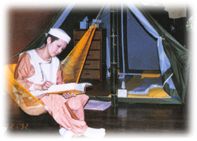
Master used to live in a tent.
The Supreme Master Ching Hai, the Quan Yin
Method and the Chinese in Southeast Asia.
Formosa, May 6, 2000.
As our group continued to grow, later on Centers were established throughout Formosa, and people volunteered to be contact persons. In this way, we set up many bases, and expanded to other countries, especially in Southeast Asia. Since the chairman has asked me to talk only about Southeast Asia, I will do just that and ignore the other areas. We have numerous liaison points in Southeast Asian and other Asian countries.
As more and more people learned about us, and as our contact Centers grew in number, an increasingly large number of people asked to see me in person. Since I could not be physically present everywhere, we began to produce video and audio tapes so we could reach more people. Then, we printed sample booklets for people who could not come to us. Later, we also issued News magazines. That was how our group developed in a natural way.

Our contact Centers are not fancy or grand by any means. They are mostly located in ordinary buildings; some are makeshift structures built with thin metal sheets. They do not look in the least bit majestic. We haven't built, and give little thought to building big, grand temples. However, when our fellow practitioners find the contact Centers too shabby, they try to do what they can to make them look better. We used to live in tents; I still have a tent up on Mount Yangming. When I am back in Formosa and if I can afford the time, I go and stay there for a while. We have no plans to build anything for ourselves. Sometimes, however, it is set up naturally.
C. Supreme Master, let me ask You a question. All of us have a complete set of information prepared by The Supreme Master Ching Hai International Association. As we listen to Master, let us turn to page 20 on "Activities in Malaysia". Please tell us something about Malaysia, where most of the people are Islamic. How did You succeed in promoting Your activities, in sharing Your Method there, when so many other people couldn't? Can You please elaborate on that?
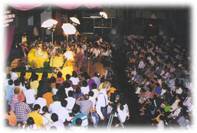
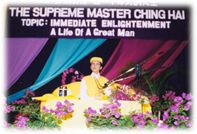
M. Most of the Chinese are rather traditional by nature. The Quan Yin Method makes no distinction between religions, nor does it mandate that people should remove their veils or worship at temples. We have already explained that the Quan Yin Method is a path that will lead us to our God Nature and heavenly Kingdom within. It does not matter what religion you follow.
Our fellow practitioners from different religions meditate together while dressed in different attire. The Muslims wear their Islamic clothes; the Buddhist monks sometimes wear their monastic robes. Even monks from different countries are dressed differently. Some of them are from the Hinayana school, while some are from the Mahayana school; some are from China and some are from Korea. They dress differently and are accustomed to a wide variety of fashions. They gather together and meditate without discussing any religious issues.
When they attain self-realization, they become better Muslims, Buddhists, or Christians. They are so full of love and joy that their traditional appearance does not affect us. Of course, as the chairman knows, Malaysia and certain other Muslim countries, being stricter than Formosa, impose some restrictions on the people, but their governments do not interfere with us. They are quite liberal. It is all right if the Muslims join us on their own initiative. We have never gone knocking on their doors or taken other actions. They come by themselves. At that time, we had a note on our lecture flyers, "Muslims are not encouraged to come." (Laughter)
C. We all know that there were anti-Chinese sentiments in Indonesia.
M. That was in the past.
C. Right! Yet You were allowed to deliver a lecture there in 1992. This is on page 21 of the information sheets provided by the SMCH International Association. In March 1992, the Indonesian government permitted Supreme Master Ching Hai to give a lecture, conducted in a question and answer format, in its country. Can You tell us about it? In 1992, since anti-Chinese sentiments were running high, Chinese literature was not allowed.
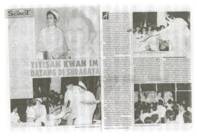

M. That is true.
C. I visited Indonesia around that time, too, but Chinese books were banned then. How did You manage to deliver a discourse there?
M. I spoke in English. However, thank you for reminding me. I had completely forgotten about the things that you just mentioned. It seems like a remote story to me. (Master laughs)
C. Right! But we research associates of the Institute of Modern History love to listen to stories. Could You please elaborate for us?
M. All right, but it was too long ago. When I finish a lecture, I forget about it. Ask me what I talked about yesterday, and I can't remember a thing. Let me take a look. Maybe it will bring back some memories.
C. Let us listen to Supreme Master.
M. The Chinese expatriates in Indonesia were miserable at the time. I cried when I heard their tragic stories. However, good will be rewarded with good. As time goes by, the arrangements will be revealed. You can see that the Chinese people there are much better off today. God has Hiers arrangements. When people misunderstand or abuse us, we should learn from the example of endurance and toleration of humiliation set by the Chinese, and we will realize that God does take good care of us. Sooner or later, Hes will fix it for us.
Back then, the Chinese people could not study Chinese. They could not even speak their own mother tongue in public; they had to speak in English or Indonesian. However, they could speak Chinese at home. When one of our well-to-do fellow practitioners invited me to his home, all of us just squeezed into his house. It was huge and had many rooms; we were in a room that was as big as this one. There, we could speak in Chinese. I gave my public lectures in English, though. I could not violate the law. Since I was allowed into Indonesia, I had to cooperate, and everything proceeded smoothly.
C. Let me ask You about Your trip to Thailand. Please refer to page 21 again. In 1994, You met Princess Sirindhorn at the Thai Imperial Palace. Can You tell us about that?
M. That was after our lecture. The royal family knew and apparently had approached our fellow practitioners about it. I don't know too much about the background story. I was there on their invitation. In most cases, our fellow practitioners make the arrangements for me. When they inform me about the invitations they have received on my behalf, I accept them when time permits. It seemed that Thailand had just suffered some kind of disaster at the time, and we had contributed some relief aid and provisions.
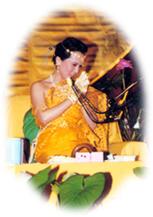
C. Quilts and woolen coats.
M. That is right. We did that on a number of occasions, not only that one time. Perhaps the royal family had learned about our contributions and wanted to meet us. It was quite an honor. We presented some gifts to the Princess. But when they arranged for a second visit, I said "Sorry" to them because I did not have time. I was busy with other matters. Members of the Thai royal family are very humble and cordial. The Princess is very pure; you will surely like her when you see her. She does not act pretentiously. She does whatever has to be done, and wears no makeup. The people love her dearly, and so do I. But I didn't have time later.
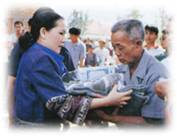
C. Please turn to page 22, about the activities in Thailand in 1999.
M. That was in Thailand. We have many activities there.
C. You have many activities in Thailand. The information here covers a World Vegetarian Congress held in Chiang Mai. Can You tell us about Your Centers in Thailand?
M. Well, we have many.
C. Do You have Centers in Chiang Mai, Chiang Rai, Bangkok, and other places?
M. Yes, we have Centers in Hatyai, Khon Kaen, and Bangkok, but I can't remember the names very well. Our fellow practitioners know better than I do. I only travel around; I don't remember much. Sometimes I work so fast that I forget the time. I have to call my fellow practitioners to ask them the date, what time to do what, and if we are leaving for Japan or staying in Formosa today. Sometimes, I am very busy, having to pack my own luggage. It can be exhausting traveling alone, but I would draw too much attention if I were to travel with a crowd. I prefer to travel silently, but I have so many matters to attend to, that I sometimes become forgetful. However, I know that we have Centers in Khon Kaen, Hatyai, Chiang Mai and Bangkok; I don't remember the others. We have a large number of fellow practitioners in Thailand. Some of them speak Thai and some speak Chinese. Their translation is not bad. When I first went to Thailand, some of the Chinese people could not speak their own language, but they soon learned after listening to my audio tapes. I joked about charging them a tuition fee! The people there are very nice and benevolent; they have great respect for spiritual practitioners. Once they notice that you are a spiritual practitioner, they kneel before you and offer you flowers. They are a very humble people.
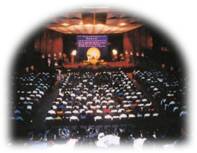
C. Now, let us go on to Singapore. You were there as early as 1991. It seems that there were some Aulacese refugees in Singapore at the time.
M. Several hundred of them.
C. What was the situation back in April 1991?